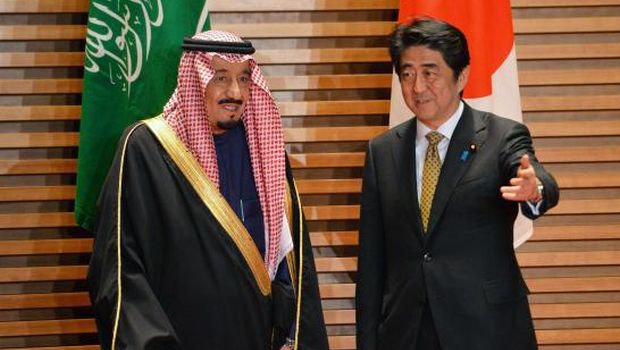
Saudi Arabian Crown Prince Salman Bin Abdulaziz, left, is greeted by Japanese Prime Minister Shinzo Abe for their talks at the prime minister’s official residence in Tokyo on February 19, 2014. (AFP Photo/Pool/Yoshikazu Tsuno)
Riyadh, Asharq Al-Awsat—Following Crown Prince Salman Bin Abdulaziz’s visit to Japan last week, a number of Japanese diplomats have said the visit will lead to a “paradigm shift” in economic and diplomatic ties with Saudi Arabia.
Speaking to Asharq Al-Awsat, a Japanese diplomatic envoy in Riyadh said: “Japan is ranked fourth in the list of investors in Saudi Arabia and we expect more mutual investment between the two countries. We also expect more Japanese projects in Saudi Arabia . . . water desalination, energy and other projects.”
He added that Crown Prince Salman Bin Abdulaziz’s visit to Japan reiterated the depth of the historic relations between the two countries, and that it would lead to a “paradigm shift” in future relations.
Yasunari said the visit had strengthened cooperation between a number of ministries, and that there had been agreements between foreign ministries of both countries, and one between their defense and finance ministries, as well as others.
Crown Prince Salman’s visit follows Japanese Prime Minister Shinzo Abe’s to Saudi Arabia last year, when both sides agreed on a comprehensive partnership in a number of economic fields.
Both visits coincide with a time when Japan’s economy continues to struggle.
With few natural resources of its own, and as it continues to reel from the aftermath of the Fukushima nuclear plant meltdown in 2011, Japan is seeking to diversify its energy sources, particularly in the Middle East
Since the 2011 nuclear disaster, all Japan’s nuclear power reactors—previously contributing some 30 percent of the nation’s entire energy needs—have been offline, leading it to turn its attention to other sources such as liquefied natural gas (LNG), of which it has now become the world’s number one importer, and oil.
Japan currently imports more oil from Saudi Arabia than any other country.
Also commenting on the visit, Takashi Shruti, political secretary of the Japanese Embassy in Riyadh, told Asharq Al-Awsat: “This visit shows that Saudi–Japanese relations are more than strategic, and we are eager to strengthen these relations in various fields.”
He pointed out that the last few years had seen a progressive growth in the relationship, particularly following the visit by Prime Minister Abe to Saudi Arabia in April 2013.
Shruti said Saudi Arabia enjoyed a stable economy and social security under the leadership of the Custodian of the Two Holy Mosques King Abdullah, part of the reason Japan was eager to strengthen these relations.
He said he expected the visit to contribute to developing trade exchange and economic cooperation between the two countries, in addition to developing cooperation at the political level and coordination on international issues in general, and regional issues in particular, notably Iran, Iraq and Syria.

Trackbacks/Pingbacks